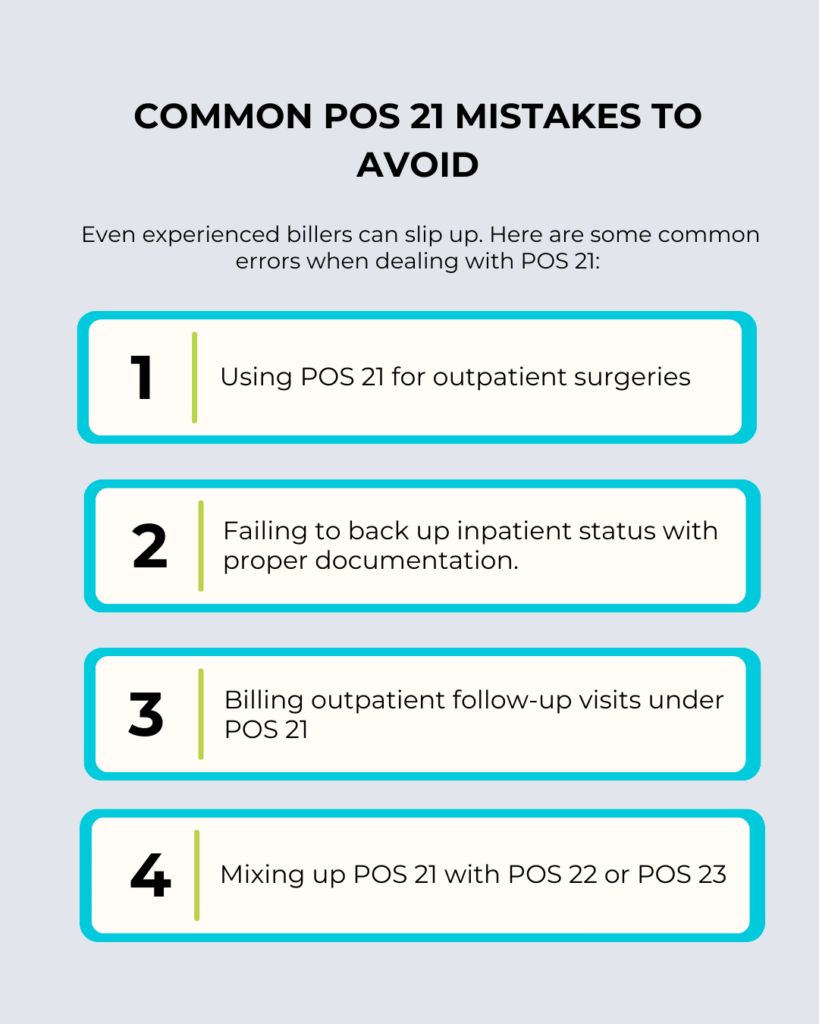When it comes to medical billing, even a small mistake can lead to big problems, delayed payments, denied claims, or even compliance issues. One often overlooked, yet extremely important, piece of this puzzle is the Place of Service (POS) code. And among the many POS codes used by providers and coders in medical billing and coding, POS 21 is one of the most significant.
When should you use it? And how can using the wrong POS code affect your bottom line?
Let’s break it down in a clear, engaging way.
Understanding POS 21: A Simple Definition
POS 21 represents inpatient hospital services in medical billing. When a healthcare provider renders care to a patient who has been formally admitted to a hospital, the provider uses POS 21 to indicate the location of that service on billing claims.
Although it’s a small piece of information on a claim form, it plays a huge role in how your services get reimbursed.
Why Place of Service Codes Are a Big Deal
An X-ray performed in a doctor’s office doesn’t cost as much as the same X-ray done during a hospital stay. That’s why payers, whether Medicare, Medicaid, or private insurance—require healthcare providers to specify the place of service with every billed procedure.
Incorrect POS coding can cause:
- Delayed payments
- Underpaid claims
- Full-on denials
- Audit flags
In other words, getting the POS code right is not just about compliances about getting paid fairly and promptly.
When to Use
Let’s make this super clear.
Use POS 21 (Inpatient Hospital) when:
- Services are provided during an overnight stay or longer
- A physician has signed an inpatient admission order
- Care involves hospital resources, such as operating rooms, nursing staff, or diagnostic labs
For example:
- A patient is admitted for chest pain evaluation and stays for two nights.
- A surgeon performs a scheduled inpatient procedure on an admitted patient.
- A hospitalist manages a patient’s diabetes and other chronic conditions during a multi-day hospital stay.
When NOT Use
Here’s where a lot of billing errors happen using POS 21 when it doesn’t apply. You should NOT use it if:
- The patient was treated in the emergency room and discharged the same day (use POS 23 instead)
- The patient had an outpatient procedure or test (use POS 22)
- There was no formal inpatient admission order
These mistakes often happen when practices try to code services manually or rush through the process. That’s where professional medical billing services make all the difference.
The Impact of POS 21 on Reimbursement
One of the reasons POS 21 is so important is that inpatient care comes with higher reimbursement rates due to increased complexity and use of hospital resources.
But higher payments also mean more scrutiny from insurance payers. If the documentation doesn’t back up the use of POS 21, your claim could get flagged or worse, denied.
To avoid these issues, providers should:
- Make sure documentation includes the admission order
- Verify that services billed align with inpatient status
- Work closely with a medical billing company that understands POS nuances
When it is used correctly, it ensures that providers are paid accurately and on time for the high-level care they deliver.
How a Medical Billing Company Helps You Get It Right
Let’s face it medical billing is complex, and POS coding is just one small part of a massive system. If you’re trying to manage it all in-house, it’s easy to fall behind or make costly mistakes.
A professional medical billing company can take this burden off your shoulders.
Here’s how they help with POS accuracy:
- Experienced Coders: Certified professionals who know exactly when to use POS 21
- Claim Scrubbing: Every claim is reviewed for POS accuracy before submission
- Real-Time Error Detection: Mistakes are caught before they become denials
- Insurance Communication: Billing companies follow up with payers on your behalf
- Compliance Support: Ensures your coding aligns with current regulations
It’s more than just outsourcing it’s partnering with experts who want your practice to thrive.
The Role of POS 21 in RCM
Let’s zoom out and look at the big picture. Correctly using POS 21 isn’t just about avoiding rejections, it’s a key part of your overall revenue cycle management strategy.
Here’s how POS 21 supports healthy RCM:
- Faster reimbursements due to cleaning claims
- Fewer denials and rework, saving admin time
- Accurate revenue forecasting based on actual service complexity
- Improved compliance during insurance audits
In a well-run revenue cycle, every step from patient intake to final payment works together to ensure timely, accurate reimbursement. POS coding is one of those crucial steps that can either keep things moving or grind everything to a halt.
Common POS 21 Mistakes to Avoid
Even experienced billers can slip up. Here are some common errors when dealing with:

Avoid these mistakes by providing staff training, leveraging billing software alerts, or outsourcing them into a reliable medical billing service.
Final Thoughts: Why POS 21 Deserves Your Attention
It may seem like just another code in the world of medical billing but it has a big impact on your revenue, compliance, and patient records. If your healthcare practice provides inpatient services, mastering POS 21 is a must.
When you get it right, you can expect:
- Proper reimbursement
- Fewer Billing headaches
- Better financial stability for your practice
And if all of this sounds overwhelming, remember you don’t have to go it alone.
Partnering with a trusted medical billing company can give you peace of mind and keep your revenue flowing without interruption. From claim accuracy to full RCM, professionals can make a noticeable difference in your practice’s financial performance.
FAQs
Q: What is POS 21?
A: It is used in medical billing to indicate inpatient hospital services when a patient is formally admitted and receives care involving hospital resources.
Q: When should POS 21 be used?
A: Use it when the patient is admitted to the hospital and receives inpatient care, including overnight stays and services requiring hospital resources.
Q: When should POS 21 not be used?
A: Do not use it for outpatient services (use POS 22), ER visits (use POS 23), or when there is no inpatient admission order.
Q: Why is POS 21 important?
A: It affects reimbursement rates for inpatient care. Incorrect use can lead to delayed payments, underpayment, or denials.
Q: What documentation is needed?
A: Document the admission order and services provided to support POS 21 claims.
Q: How does POS 21 impact revenue cycle management (RCM)?
A: It ensures timely reimbursements, fewer denials, and better compliance, supporting efficient RCM.
Q: What common mistakes to avoid with POS 21?
A: Avoid using POS 21 for outpatient care, failing to document inpatient status, or mixing up with other codes like POS 22 or POS 23.
Q: How can a billing company help with POS 21?
A: A billing company ensures correct POS coding, performs claim scrubbing, and manages errors, improving payment accuracy.







